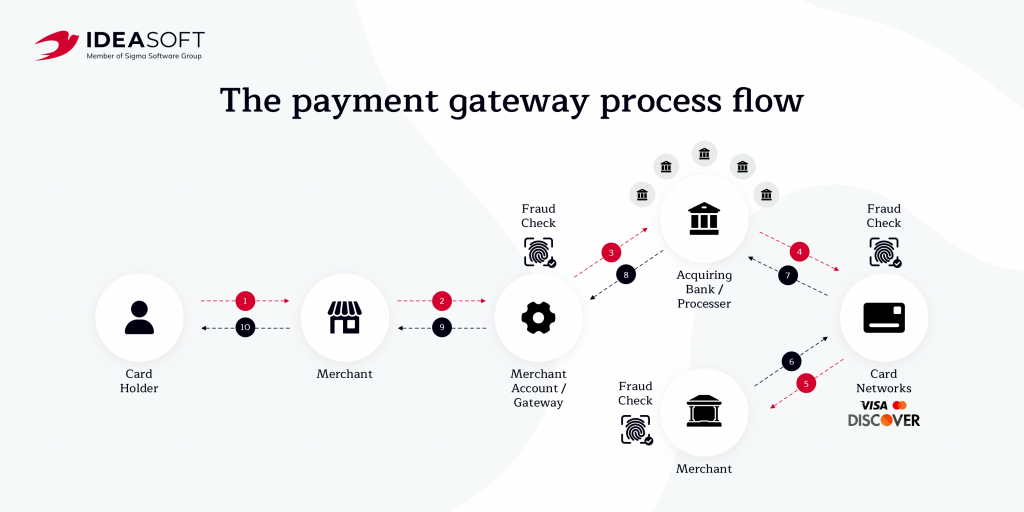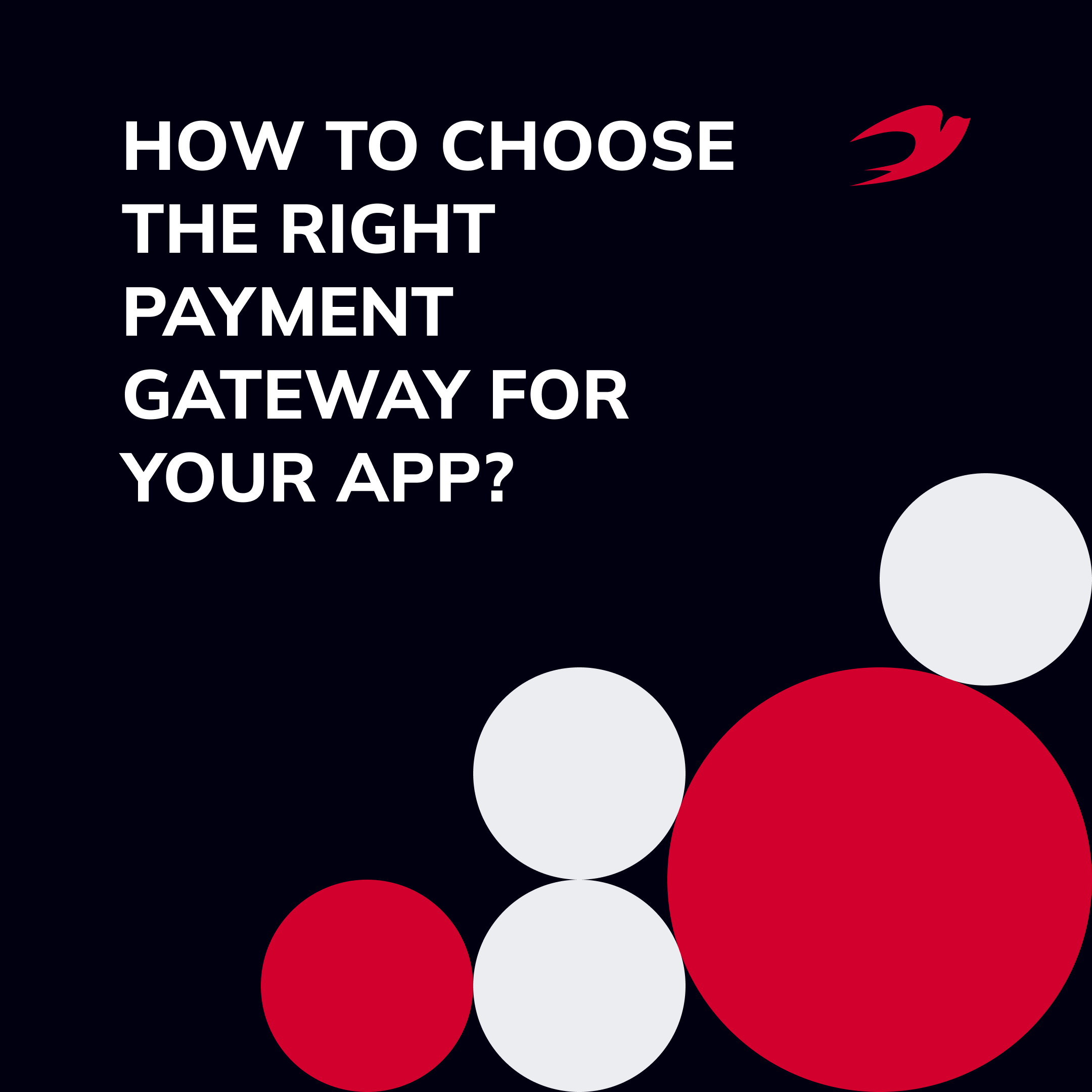Online payments have made our lives easier, and sometimes we don’t even bother carrying our wallets when going out. According to online payment statistics, 82% of respondents use credit or debit cards as well as smartphones for online shopping because they consider them more accessible for shopping. Having grown accustomed to these payment methods, we don’t even think about how they work from a technical point of view, but everything changes when you find yourself on the other side and you want to develop an application that supports online payments. In that case, you will have to choose a payment gateway that allows customers to quickly and safely pay for goods or services. So how do you choose the right payment gateway for your application and integrate it correctly? After reading this article, you will have answers to all these questions.
Table of contents:
- What is a payment gateway?
- Key factors to consider while choosing a payment gateway
- How to set up a payment gateway?
- Custom payment gateway development
- Final thoughts
What is a payment gateway?
Since the beginning of the coronavirus pandemic, more and more businesses have been undergoing a digital transformation, and the importance of implementing a payment gateway for accepting payments online has become even more relevant. Before we start figuring out how to choose a payment gateway, let us explain what it’s all about.
Payment gateway is a technology that allows mobile apps and websites to accept online payments from users. It securely transmits all payment details and protects credit card information by encrypting all sensitive information it stores. The payment gateway automatically processes the customer’s data and ensures that personal data and funds are securely transferred between the buyer and the merchant. The whole process takes only a few seconds and the typical procedure works like this:
- Users enter card information into the payment gateway.
- The payment gateway encrypts the card details and sends the information to the acquiring bank.
- The acquiring bank sends the request to a payment system (MasterCard, VISA, American Express, etc.).
- The payment system checks the validity of the entered data and, if necessary, the second stage of the two-factor authentication is performed. The user is usually asked to enter a code sent to them with the details specified in the agreement from the issuing bank on a separate secure page.
- After confirmation, the payment system continues processing the request for the transaction. It analyses the cardholder’s reputation, analyzes the term of the transaction, and transfers information about the card and the payment amount to the issuing bank.
- The issuing bank checks whether the bank card belongs to the cardholder, its status (active or blocked), the availability of the required amount on the account, and sends its decision to approve or reject the transaction.

If the transaction is approved, the issuing bank transfers money to the payment system. Further along the chain, the money goes to the acquiring bank. This is how it works.
Key factors to consider while choosing a payment gateway
There are plenty of gateways on the market so choosing one can seem daunting, especially if this is the first time you have encountered them. The most popular payment gateways may not always suit your business needs and goals, so let us tell you about the key factors that influence the choice of a payment gateway.
Fees and service agreement requirements
One of the most critical factors in choosing a payment gateway you should consider is pricing and fees. The amount of the fees depends on the volume and frequency of transactions carried out by the business. However, some service providers may require setup fees or additional transaction fees if a particular order or transaction volume threshold is not met. In addition, various payment gateways may charge the following fees:
- Payment gateway purchase fee
- Monthly subscription fee
- Annual maintenance fee
- Hidden charges
Make sure you know the full list of these commissions and how they would fit your business model.
Payment security
Security is the main factor that influences the choice of a payment gateway. The choice of a reliable provider is determined by the fact that it has a certificate of compliance with the PCI DSS security protocol – a standard for ensuring the security and safety of bank card data when paying for goods and services online. To comply with the PCI standard, a service provider must implement a fully secure network, regularly test it, and implement encryption and access control elements into security systems.
Payment methods supported
Most gateways only accept defined types of cards, payments, and currencies. If you are running an international business or want to expand it beyond national borders, you should consider a payment gateway that allows payment, not only in local currency but also deals with foreign currency exchange processes. In addition, online payments are no longer limited to accepting debit or credit cards but also include other payment sources such as internet banking and digital wallets (Apple Pay, Android Pay, etc.).
Hosted versus Integrated platforms
There are two types of payment gateways on the market – hosted and integrated.
Hosted payment gateways redirect your users to the payment processor’s page where they input their payment details. This type allows you to mitigate risks because sensitive information is not stored in your app saving you the extra effort and expense of safeguarding that information.
Integrated payment gateways provide users with a way to enter payment details without leaving the site page. This increases the convenience for them as they don’t have an additional step to follow. However, it makes you more responsible for storing your users’ payment information. You should decide which option suits you best.
Customer Support
Customers can shop in your app 24/7, so there may be payment issues at any time that require support from the payment gateway support team. You should check whether the provider offers live technical support around the clock or only during business hours so that they can quickly resolve any technical problems.
We have gathered data for you on 3 popular payment gateways: PayPal, Stripe, and Braintree. The table below shows a comparison of key factors between these payment gateways.
| PayPal | Stripe | Braintree | |
| Price | Transaction fee: 2.9% + $0.30 per U.S.Chargeback fees: $20Monthly fees: no fees or $30 in case PayPal Payments Pro packageCurrency conversion fees: varies from 0.4% to 3.3%. | Transaction fee: 2.9% + 30 cents per successful chargeChargeback fees: $15Monthly fees: noneSetup fees: noneCurrency conversion fee: 2% | Transaction fee: 2.9% + 30 cents per successful charge. No fees for the first $50,000 processedChargeback fees: $15Monthly fees: noneSetup fees: noneCurrency conversion fee: 2% |
| Payment details | 9 types of credit/ debit cards, bank account, PayPal account, rewards balance | 6 types of credit/ debit cards, e-wallets, | 7 types of credit/ debit cards, e-wallets, Bitcoin |
| Number of currencies | 25 | 135+ | 130+ |
| Number of countries | 200+ | 35+ | 45+ |
| Support | PayPal community, resolution center, chat, phone, social media | Email, phone, chat support | Phone, email |
How to set up a payment gateway
Every payment gateway provider offers a software development kit (SDK) and API (Application Programming Interface) for integration in the app.
SDK contains a detailed description of the gateway, code samples, clear guidelines, and comprehensive libraries for implementation. SDK can be found on providers’ official websites and is used by software development teams to utilize it as an in-app feature. The SDK integration process consists of setting up the server-side and the client-side. For businesses looking to tailor features to their specific needs, custom app development often includes optimized payment gateway integration.
The gateway API helps configure SDK’s and libraries as a significant part of integrating payment gateways in-app. Using the API, developers can contact the back-end of the app and create a request to receive a response from the server. API in payment gateway integration provides more control over the checkout and facilitates the management of payments.
We will look at the technical features of integrating the above payment gateways that provide SDK for app integration.
PayPal
PayPal’s Payment Buttons can be integrated by merely pasting an HTML fragment onto your website. This option allows you to create a customizable payment button and integrate it with your application without any coding skills.
Integrating Express Checkout and PayPal Pro using Payments REST API or Braintree Direct SDK requires technical expertise. For additional pre-set options, the SDK is easily customizable and manages all integrations from a single control panel on the back of the pre-set options.
Stripe
Stripe was built for developers. Its clean and well-documented APIs offer a robust and thoughtful framework for building custom integrations. The gateway’s documentation and SDK are by far the most extensive of the three systems. In addition to official libraries, there are several community-created libraries and plugins for WordPress, Joomla, Magento, etc. Besides, Stripe supports a wide range of languages (Java, PHP, Ruby, Python, Go, Node, .NET) and platforms (web, Android, and iOS).
Braintree
Braintree is another developer-oriented gateway. The SDK documentation is divided into sections for Android, iOS, and the web. Braintree supports a broad range of languages (Java, PHP., Node.js, NET, Ruby, and Python).
Custom payment gateway development
Although the choice of payment gateway providers on the market is vast, it may be that none of the suggested gateways fully meet the goals and needs of your business. None of the gateways will provide you with complete control over the payment process and there may be additional options that you might want to change or add.
The good news is that you can always develop a custom payment gateway that will allow you to meet all your business needs. Let’s take a look at the benefits of custom payment gateways.

Cost-effectiveness
Ready-made payment gateways oblige you to pay fees for every operation and impose various restrictions on the number and volume of transactions. The custom solution eliminates intermediaries in the role of gateway providers, which will give you complete control over the transactions and reduce the cost of fees.
Better сustomization
The development of a custom payment gateway allows you to integrate it into any product type, as many mediums and any in-house system you like without any limits. You get precisely the functionality that meets all your business needs instead of paying for features you don’t really need.
More payment methods accepted
All payment gateways are limited by the number of accepted payment methods. A custom solution is a great option if you want to choose exactly those payment methods that are relevant specifically for your business and not pay extra fees. It also lets you introduce innovative payment methods that no other payment gateway can offer, such as payment in cryptocurrency, QR code payment, etc.
Additional revenue
Having a custom payment gateway, you can become a provider and propose it as a service to other merchants and agents. This means you can charge registration fees and transaction fees from other merchants. Thus, it can give new development and additional income to your businesses bottom line.
Final thoughts
Payment gateway integration has become the norm in today’s application development industry. There are many different payment gateways on the market. When choosing a payment gateway, we recommend paying attention to the proposed payment methods, prices, payment security, and integration method. However, if you need a solution built entirely for your business, meeting all its needs and the needs of your customers, it is better to develop a custom solution and IdeaSoft would be happy to help you with this.
IdeaSoft, part of the Sigma Software Group, provides expert fintech software development services for financial businesses around the globe. The company’s portfolio includes successful projects in banking software, lending/borrowing protocols, financial planning tools, open banking solutions and more. The IdeaSoft team works with a wide technology stack, including such advanced technologies as blockchain and AI/ML. This allows us to create truly innovative solutions that meet the needs of the market.
Feel free to contact us to discuss your next project.

